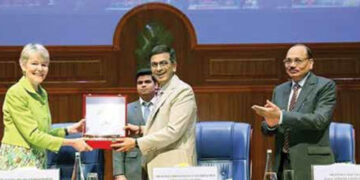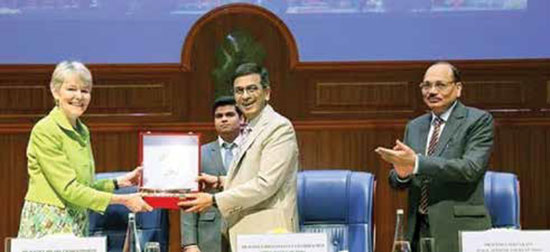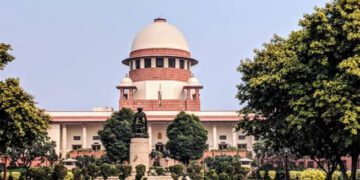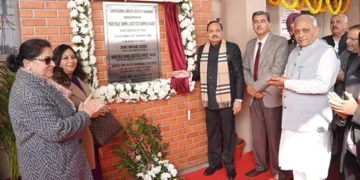Team Blitz India
NEW DELHI: Diversity and representation are essential to enrich the decision-making capacity of courts, said Chief Justice of India DY Chandrachud in his address at the second Supreme Court of India annual lecture series, in New Delhi on February 10. The institutions of law cannot remain aloof from socio-political realities and aspirations of the time, he said.
“There was once a notion of law which limited us to merely an isolated arena from society. Today, legal fora across the globe are recognising that they cannot view themselves as divorced from the socio-political realities and aspirations of the time,” the CJI said, and added: “This recognition fosters an environment conducive to mutual learning and exchange of ideas.”
Intricate relationship The CJI, in his address, highlighted the dichotomous yet intricate relationship between the law and politics.
Welcoming Justice Hilary Charlesworth, a judge of the International Court of Justice, Chief Justice Chandrachud drew a parallel between the journey of the ICJ and the Supreme Court. He pointed out that the latter is entering its 75th year while the international court celebrated 75 years of its inception in 2021.
“Today, there are 193 United Nations member states. The existence of diverse member states has had a tangible influence on the kind of cases that the ICJ is faced with today.
Not only has there been an increase in the number of cases brought before the court, but the subject matter of the cases has also seen a sea change.
Various nations are calling on the court to determine issues of human rights including questions about the Genocide Convention and the Convention on Torture,” the CJI said. In this way, he pointed out, the change in global politics has been crucial in shaping the transformation of ICJ, reflecting the deep interplay between politics, power and the law.
“Similarly, the institution of the Supreme Court of India in 1950, which we have gathered to commemorate, was also a moment that marked political and social transformation. It cannot be viewed as divorced from the political realities of its time. The sitting of the Supreme Court for the first time echoed the aspirations of a nascent country burdened by the legacy of colonial rule and entrenched social stratification, yet equipped with a transformative, progressive, and foresighted Constitution,” he said.
Over the years, he said, the Supreme Court has embodied these aspirations by crafting a vast body of jurisprudence aimed at liberating India from its colonial past and fostering the groundwork for social transformation.
“In this journey, the apex court of the nation has emerged as a product of the interplay between polity, societal aspirations, and the law,” said the judge, pointing out that diversity and representation can go a long way in improving the decision-making capacity of courts.
Broadened spectrum
“The evolving representation of nation-states before the International Court of Justice has notably challenged its historically mono-cultural and Eurocentric outlook. Likewise, integrating gender diversity within the courts would substantially broaden the spectrum of perspectives, leading to more comprehensive and equitable decisions,” he stressed.
Underlining that Justice Charlesworth is the fifth woman to serve on the ICJ in the court’s 77-year history, the CJI said that to have more women as judges of ICJ is not the responsibility of the court alone, but a share of the responsibility must be borne by nation-states and national groups responsible for the nomination process.






























